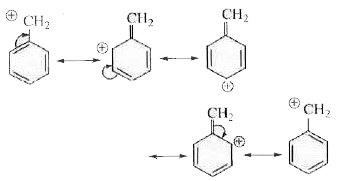Benzyl chloride undergoes nucleophilic substitution much more easily than chlorobenzene. Explain.Solution in Telugu
Benzyl chloride undergoes nucleophilic substitution readily via resonance stabilised benzyl carbocation.

On the otherhand C-Cl bond in benzene has partial double bond character due to resonance and hence is difficult to cleave.
Hence, benzyl chloride undergoes nucleophilic substitution much more easily than chlorobenzene.
Topper's Solved these Questions
- ALKYL AND ARYL HALIDESBOOK - AAKASH SERIESCHAPTER - ALKYL AND ARYL HALIDESEXERCISE - SUBJECTIVE EXERCISE-1( SHORT ANSWER QUESTIONS)
5 Videos
- ALKYL AND ARYL HALIDESBOOK - AAKASH SERIESCHAPTER - ALKYL AND ARYL HALIDESEXERCISE - SUBJECTIVE EXERCISE-1( VERY SHORT ANSWER QUESTIONS)
2 Videos
- ALDEHYDES AND KETONESBOOK - AAKASH SERIESCHAPTER - ALDEHYDES AND KETONESEXERCISE - Exercise 3.2
41 Videos
- AMINES AND AZO COMPOUNDS BOOK - AAKASH SERIESCHAPTER - AMINES AND AZO COMPOUNDS EXERCISE - PRACTICE SHEET - 6 (Integer answer type Questions)
9 Videos
Similar Questions
Give IUPAC names of isobutyl chloride, secondary butyl chloride and tertiary butyl chloride.
View SolutionWhat are geminal dihalides and vicinal dihalides ? Give examples.
View SolutionGive the IUPAC names of the following compounds: (CH3)3CCH2CHO,CH3CH=CHCHO,CH3CH2COCH(C2H5)CH2CH2ClandCH3CH(OH)CH2COCH3
View SolutionHow many aromatic (six membered carbocyclic) isomers possible for MFC7H9N.
View Solution(A) 4-Nitrochlorobenzene undergoes nucleophilic substitution more readily than chlorobenzene. (R) Chlorobenzene undergoes nucleophilic while 4-nitro chlorobenzene undergoes nucleophilic substitution by addition elimination mechanism.
View SolutionExplain the following: (i) In nucleophilic aromatic substitution reactions, fluorides are more reactive than chlorides while in aliphatic nucleophilic substitution reactions reverse is true.
(ii) Chlorobenzene forms grignard reagent in THF but not in ether.
View Solutionक्लोरोबेंजीन और बेन्जिल क्लोराइड में से कोण-सा जलीय NaOH द्वारा आसानी से जल अपघटित होता है, और क्यों?
View SolutionWhich undergoes nucleophilic substitution most easily-
View SolutionBenzene does not undergo nucleophilic substitution, even though it undergoes electrophilic substitution easily. Explain.
View SolutionAllyl chloride is more reactive than n-propyl chloride towards nucleophilic substitution reaction. Explain why ?
View SolutionBenzyl chloride is more reactive than chlorobenzene towards nucleophilic substitution. Explain.
View SolutionWhich of the following statements are correct?
Alkyl chlorides are lighter than water
Tetrachloromethane is heavier than water
Alkyl chlorides undergo nucleophilic substitution more easily than alkyl bromides
Fluorobeznene can be prepared by sandmeyer's reaction
View SolutionWhich of the following will undergo nucleophilic substitution more easily
View Solutionp-nitro chlorobenzene undergoes nucleophilic substitution faster than chlorobenzene.
View SolutionEthyl chloride is more reactive than vinyl chloride towards nucleophilic substitution. Explain
View SolutionAlkyl Chloride is more reactive than chlorobenzene towards nucleophilic substitution. Explain.
View Solution
